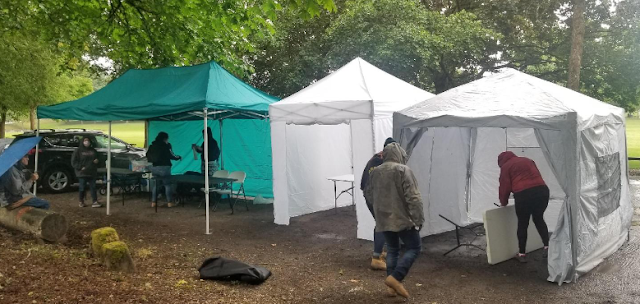By Sarah Owens and Michael Livingston
 |
| Outreach workers from The ARCHES Project set up tents in a Salem park. Photo courtesy The ARCHES Project. |
As discussed in a recent post (see "MWV Homeless Alliance Launches in Pandemic"), the Alliance plan is the latest version of a plan adopted in 2017 by the Mid-Willamette Homeless Initiative Task Force. Staff say it is intended to be "a living document", whatever that means. Board members have expressed concern that the forty-page plan is overly ambitious, or worse, "boiling the ocean", and doubts about the connection between plan goals and HUD's "System Performance Measures" (SPMs). (SPMs are based on narrowly-defined, client-specific data collected in ServicePoint, Oregon's Homeless Management Information System or HMIS.) As with the 2017 plan, it's unclear who or what will be responsible for execution, if anyone. For complete plan analysis, see "MWV Homeless Alliance Plan Needs Work."
The week began with the same City Council that enacted bans on camping, sitting and lying on sidewalks and public rights of way issuing a proclamation claiming that the City "at all times strives for justice, freedom and equity" and "does not tolerate any violation of anyone's civil and human rights." Notwithstanding that declaration, three councilors (all of whom proudly voted for the bans), called for "a systematic review of [police] policies and training that facilitate fairness, justice and accountability." A fourth called for the police, future councils and department heads to undergo anti-(racial)bias training. Council did not, however, join city and county councils across the U.S. and officially recognize systemic racism as a public health emergency (see Singh, M. "'Long Overdue': lawmakers declare racism a public health emergency." (12 June 2020, Guardian.))
Remember six months ago, how "amazed" Mayor Bennett was that Councilor Leung could suggest anyone on the Salem police force might have "some sort of inappropriate relationship with the public they serve", because he himself had never heard such a complaint, despite having just been informed by Leung, the sole person of color on the Council, that she had received such complaints and found them credible? See "Too Long...Don't Get It."
 |
| Tom Andersen, Ward 2, at the End White Silence rally on June 13. Photo courtesy @Clypian. |
As we write this, Councilor Andersen is at the Capitol telling the crowd, “I am a
privileged white male. Racism is my problem. Racism is a city council
problem.” He says he wants to make changes at Council. Maybe he should start by repealing sit-lie, which was opposed by Councilor Leung (only) and by Latinos Unidos Siempre,
Mano a Mano, PCUN, RJOC, American Friends Service Committee, Planned
Parenthood, Safe Routes Partnership, Oregon Law Center and Disability Rights Oregon, among others.
Disability Rights Oregon hasn't let the issue go. In May, the group expressed concern about the City's "misguided" approach to dealing with street homelessness by enacting camping and sit-lie bans and their "detrimental impact to persons with disabilities, particularly unsheltered individuals with serious mental illness." See Woodworth, W. "Advocacy group: Salem violated Constitution, pushed homeless out using COVID-19 excuse" (19 May 2020, Statesman Journal.) The City's self-serving reply claimed Council was "compelled to take action to slow the spread of COVID-19 and protect the health of all in our community."
Protecting something more important is the consummate, perennial excuse: I have nothing against multi-family housing, I just want to preserve neighborhood property values. Councilor Ausec told Chief Moore and the Council Monday night that he thinks the community values life and liberty more than property, so police should, too. Councilor Ausec was absent when Council enacted sit-lie. He did not seek reelection.

No comments:
Post a Comment